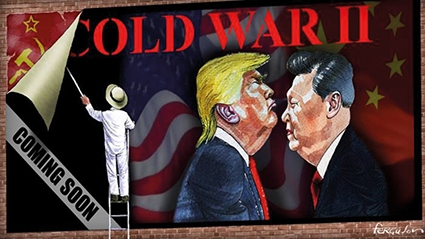The Age of a New Cold War
Op-Ed
It has been au courant since the Ukrainian crisis in 2014 that a new Cold War started between the West and Russia. Proponents of this view argued that Russia has been waging almost the same level of war as the Soviets in the 20th century.
This mal-argued view, however, made world politicians and the analytical community believe that Russia should and will be a focus of the West's foreign policy.
Few have discerned China as a true challenger to the US-led world. Many believe that America's trade war with China is just temporary, even a tactical battle, with Washington seeking only to achieve better economic opportunities. The argument goes that once the trade issue is resolved, Washington and Beijing will return to normal relations.
This might not be true. Beyond trade issues, there is a plethora of other economically and militarily important things on which the US and China do not agree.
The US views the Chinese grand project 'Belt and Road Initiative' with suspicion, which aims at restructuring trade routes across the Eurasian landmass and redirecting them towards the Chinese heartland. For the US, this could create troubles, as Washington has historically viewed the Eurasian continent as a place where no sole country should attain enough power to dominate it entirely, or even half of it. The Soviets tried to dominate the entire landmass, but their capabilities (aside from military) were limited, and communism was not attractive enough. The Chinese possess more financial resources to influence the Eurasian states, and this is worrisome for Washington.
There is also a military problem: the Chinese are building their military fleet and a powerful land army. This will enable Beijing to challenge the US dominance in the South China Sea and the surrounding waters. In a way, China does what the US aimed to do in the 19th and early 20th century near its coast in the Caribbean Sea and Pacific Ocean. Control over those waters projected US power to a global scale and propelled its intervention in the two world wars. From the US perspective, if the Chinese manage to dominate their immediate waters, Beijing's power will be projected over the Pacific and Indian oceans. This would mean China controlling military and economic routes, making the country a true global power, thus the US’ direct adversary.
There are irreconcilable differences between the US and China and it should be emphasized that the trade issue or troubles around Chinese telecom companies (even if they are settled) does not represent a climax in the battle but just only part of the grand geopolitical struggle between the two giants.
On top of this battle there is also an ideological difference which gives this competition a distinct mark. True, in the Cold War the Soviets were feared and despised for their official contempt for capitalism, but in China that is not the case. The West fears China because of the way the world would look under the Chinese dominance. No such historical precedent has existed in Chinese history and the Westerners fear exactly this lack of knowledge.
Moreover, the West also sees the Chinese with contempt for its one-party rule and strong-hand approach to those who oppose it, often accusing Beijing, for example, of harsh policies towards the Uighurs in the west of the country.
These ideological, one might even say civilizational, differences breed mistrust between China and the US, and this is most dangerous for the world.
History shows that general mistrust can be deadly. The British government entered the war on the allies' side in July 1914 largely because of fear of what a German-led Europe would be: better the devil you know with well-known rival France and even Russia, which had its own ambitions, but still ambitions which were controllable in the longer term.
In a way, total mistrust towards Stalin, rather than a policy based on raw facts, led Hitler to attack the Soviet Union in June 1941.
The US and China now see each other through these lenses, and this is dangerous for peace in the world. Again, trade issues might be resolved, but other troubles will arise which could spiral into an outright confrontation (not necessarily a military one, but still an open rivalry).
Both countries will now accelerate their scramble for allies for a rising conflict and one actor is particularly important to watch – Russia. True, Russia-US relations are at an all-time low and it is hard to see how relations will improve, but the US will need to make a strategic decision whether to press Moscow and Beijing simultaneously, a strenuous task, or try to pull Moscow closer to its orbit by giving geopolitical concessions to the Russians in exchange for support in a struggle with China. The same will be done from the Chinese side: Moscow is too important to lose. Amid these potential scenarios, Georgia’s geopolitical future depends much on which side Russia will take.
By Emil Avdaliani
Image source: ft.com












